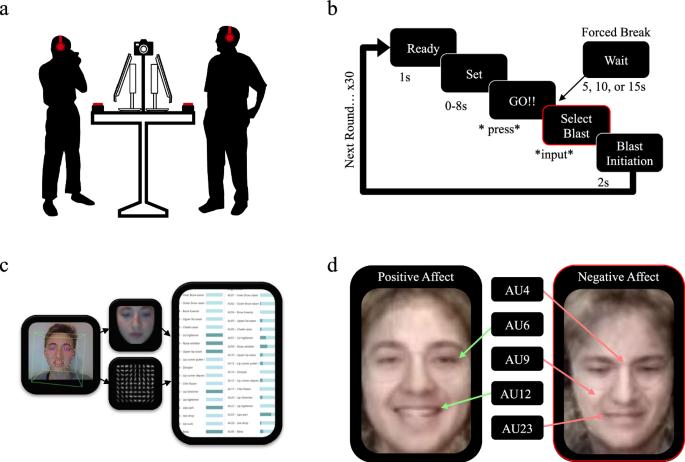Both partners’ negative emotion drives aggression during couples’ conflict
引用次数: 0
Abstract
Researchers examining conflict between intimate partners believe that the experience and expression of emotion drives aggressive behaviour. Intra-personally, increases in negative affect make aggression more likely. Inter-personally, theoretical models suggest that each individuals’ perception of their partners’ emotion also influences aggression, potentially creating a Violence Escalation Cycle. Here, using a lab-based aggression task across a primary study (n = 104, number of trials = 3095) and a replication (n = 58, number of trials = 3167), we show that both intra- and inter-personal experiences of negative emotion predict reactive aggression within couples, revealing retaliation but not escalation. Critically, analyses of facial affect reveal that prototypic displays of negative emotions have a compounding effect, leading to dramatic changes in aggression depending on whether one, both, or neither partner expressed negative emotion. We propose a mechanism by which temporal delays (i.e., experimentally imposed forced breaks) reduce aggression by decreasing negative emotional arousal and limiting impulsive action. Our results show that both forced breaks and elective breaks (i.e., extra participant-initiated extensions of the forced break time) reduce aggression, providing exciting evidence that interventions focused on preventing impulsive action when people are in a provoked state can reduce aggression within couples. Couples competing in a reaction time task where they can play loud sounds to their partner are more aggressive when negative facial affect is expressed. Couples retaliate, but introducing short breaks reduces negative affect and aggressive behaviour.

在夫妻冲突中,伴侣双方的负面情绪都是攻击行为的驱动因素
研究亲密伴侣间冲突的研究人员认为,情绪的体验和表达是攻击行为的驱动力。在人与人之间,负面情绪的增加更有可能导致攻击行为。从人际关系来看,理论模型表明,每个人对伴侣情绪的感知也会影响攻击行为,从而可能形成暴力升级循环。在这里,我们通过一项基于实验室的攻击任务的初步研究(n = 104,试验次数 = 3095)和一项重复研究(n = 58,试验次数 = 3167)表明,人内和人际间的负面情绪体验都能预测夫妻间的反应性攻击,揭示了报复而非升级。重要的是,对面部情绪的分析表明,负面情绪的原型显示具有复合效应,会导致攻击性的巨大变化,这取决于一方、双方或双方都没有表达负面情绪。我们提出了一种机制,即时间延迟(即实验中施加的强制中断)通过降低负面情绪唤醒和限制冲动行为来减少攻击性。我们的研究结果表明,强制休息时间和选择性休息时间(即参与者主动延长强制休息时间)都能减少攻击行为,这为我们提供了令人兴奋的证据,证明当人们处于被激怒状态时,专注于防止冲动行为的干预措施可以减少情侣间的攻击行为。在一项反应时间任务中,参加比赛的情侣可以向其伴侣播放响亮的声音,当伴侣表达负面面部情绪时,情侣的攻击性会更强。情侣们会进行报复,但短暂的休息会减少负面情绪和攻击行为。
本文章由计算机程序翻译,如有差异,请以英文原文为准。
求助全文
约1分钟内获得全文
求助全文

 求助内容:
求助内容: 应助结果提醒方式:
应助结果提醒方式:


